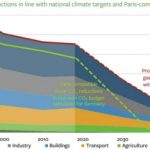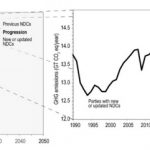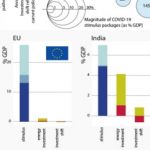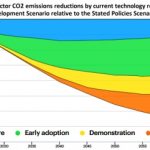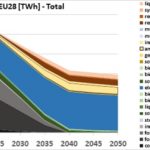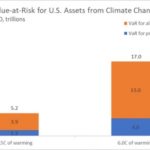Globally, current Nationally Determined Contributions (NDCs) targets are within reach thanks to the increasing speed of clean energy transitions around the world. That’s as NDCs have, as planned, got more ambitious as nations have updated them every five years. The problem is current NDCs are still not ambitious enough to meet our actual 2050 net zero target. Daniel Wetzel, Gabriel Saive, Luca Lo Re and Alice Latella at the IEA summarise the … [Read more...]
Carbon Capture rates of 60% sound impressive. But rising carbon prices could still make you commercially unviable
Mainstream scenarios state the unavoidable need for continued use of fossils through to 2050. For the world to stay within its carbon budget, that means the unavoidable need for carbon capture and plugging “fugitive” leaks. Chris Bataille at the Center on Global Energy Policy flags up the danger that new CCS projects with seemingly impressive capture rates of up to 60% may nevertheless become commercially unviable as carbon prices rise: that … [Read more...]
Nearly half of national climate pledges (NDCs) intend to keep extracting fossil fuels
“Nationally Determined Contributions” (NDCs) are a nation’s published plans to reduce emissions and adapt to the impacts of climate change. Natalie Jones at the IISD, writing for Carbon Brief, summarises her co-authored study that reviews the fossil fuel production element of those NDCs. Nations are obliged to update their NDCs every five years, to give more detail. That added detail is a cause for concern in the latest round of NDCs: there is an … [Read more...]
Will COP26 set right the booming Carbon Offset Market
Carbon offsetting is when a company, rather than cut its own emissions, pays someone else somewhere else to cut their emissions. It has always been controversial because it has two main problems. Buying carbon credits means you aren’t putting the effort in to cut emissions yourself. And the risk of double-counting: when the company reports it has cut emissions, and so does the “someone else”. A third problem exists too: measuring whether the … [Read more...]
UNEP 2021 Emissions Gap report: only 11 countries have net-zero targets enshrined in law
Zeke Hausfather at Carbon Brief summarises the UNEP 2021 Emissions Gap report, released last week. It explores the impact of the net-zero emissions pledges of nations, and the “gap” between them and the Paris targets. As COP26 gets started, 136 countries either have some form of commitment to a net-zero target or are considering it. Of those, 49 plus the EU have a firm net-zero commitment. But only 11 countries have targets enshrined in law. … [Read more...]
Germany’s highest court rules climate laws are insufficient, violate rights, unfairly burden future generations
In an unexpected decision widely hailed as historic, Germany's highest court has ruled that the government's climate legislation is insufficient, and lacks detail on emission reduction targets beyond 2030. Sören Amelang, Kerstine Appunn, Charlotte Nijhuis and Julian Wettengel at Clean Energy Wire run through the background and the consequences of the case brought by youth activists and NGOs. Legal experts say the decision “significantly … [Read more...]
Updated NDCs: World committing to 0.5% emissions cuts by 2030. It should be 45%
The latest national climate pledges, submitted over the new year, show that the world is nowhere near meeting our emissions reductions goals. Analysis of the 48 updated “nationally determined contributions” (NDCs) submitted so far (everyone must submit by the end of this year), covering nations responsible for 29% of global emissions, shows we will have 0.5% lower emissions in 2030 compared to 2010. That’s way off the target 45% reduction needed. … [Read more...]
New net-zero pledges from China, US, EU and others can meet our climate goals, says UNEP. But…
Existing national commitments imply that today’s emissions will simply plateau, remaining only slightly below 2019 levels by 2030. However, according to the latest UN Environment Programme (UNEP) emissions gap report, the new commitments from China, the EU, Japan, South Korea, the UK, Joe Biden’s US and others are “broadly consistent” with the Paris Agreement’s 1.5C goal for 2050. But commitments aren’t policy, warns UNEP, and only real change … [Read more...]
Coastal town Grande-Synthe took France to court over missed climate targets. How, why and what happens next
Taking your own government to court is an indispensable tool for sticking to our climate goals, says Lucien Chabason at the IDDRI. In November, the French State Council (Conseil d'État) gave an interim judgment largely favourable to the municipality/commune of Grande-Synthe following the government's implicit refusal to take additional measures to comply with the Paris Climate Agreement. Grande-Synthe sits on the coast by Dunkirk and is at … [Read more...]
The energy transition needs some of the $12tn global Covid stimulus. But much less than you think
Governments worldwide have committed over $12tn to recover from the Covid-19 pandemic, spent over the next 5 years. Current estimates say the energy transition needs $1.4tn/year globally between 2020 and 2024 to get us on the path to meet the 1.5oC Paris goal. Clearly, there is an opportunity here. Although support for healthcare systems and the overall economy are the stated priority of governments, much of that $12tn is still not committed. … [Read more...]
The Energy Charter Treaty needs updating, but remains a valuable tool for the transition
Last Thursday we published this critique of the Energy Charter Treaty (ECT). Created in the 1990s, the ECT was designed to protect cross-border energy investments from political risk. Critics now say it is being used to protect fossil fuel investments in a world committed to phasing them out. Today, Andrei Belyi of energy consulting firm Balesene OU and Adjunct Professor in Energy Law and Policy at the University of Eastern Finland, who was named … [Read more...]
Energy Charter Treaty: reform will only happen when energy ministers get involved
Negotiations are underway for the reform of the Energy Charter Treaty (ECT), an international trade agreement under fire from former Energy Charter executives, members of the European Parliament, and NGOs. Created at the end of the cold war, it was designed to protect cross-border energy investments – in a fossil fuel world – from political risk. Clare Taylor quotes the critics who say it no longer makes sense for the treaty to protect oil and … [Read more...]
IEA: Without accelerating clean energy innovations we cannot hit net zero by 2050
The impressive rise of renewables and energy efficiency, alone, will not be sufficient to meet the world’s 2050 emissions goal, says the IEA in its flagship Clean Energy Innovation report. New technologies, taken all the way through to widespread adoption by the market, must become an essential part of the net zero pathway. The stark warning is that existing policies to decarbonise shipping, trucks, aviation and heavy industry are not nearly … [Read more...]
The PAC Scenario: net-zero by 2040 to meet Europe’s Paris goals
The EU is not on track to meet its Paris Agreement obligations on emissions and limiting the global temperature rise to 1.5°C. CAN Europe and the European Environmental Bureau (EEB) present their Paris Agreement Compatible (PAC) scenario, designed to do just that. It’s been created through the careful analysis of contributions from more than 150 stakeholders including NGOs, scientists, industry and grid operators. Jörg Mühlenhoff at CAN Europe … [Read more...]
The cost of climate inaction: putting a $ price on 4.5°C warming
Oriana Tannenbaum and Rushad Nanavatty at Rocky Mountain Institute (RMI) have gathered data that puts a price on not making the necessary investments in tackling climate change. For the U.S., a 4.5°C warming scenario (by 2050) will cost $5.2tn. At a more drastic 6°C the cost is $17tn. These projections are hard to do when treating the climate as an “infrastructure asset”, though proven methodologies do exist for tradition assets, and the authors … [Read more...]
- 1
- 2
- 3
- 4
- Next Page »






